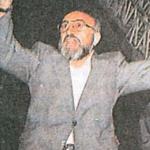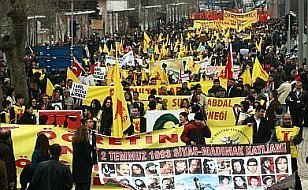The initiatives of the Hacı Bektas Veli Anatolia Culture Foundation (HBVAKV) and the Anatolia Culture Associations (AKD) resulted in the founding of the Alevi Institute. The institute plans to do research in this area.
Giving a speech at the opening ceremony, Ertuğrul Günay, Minister of Culture and Tourism, apologized to the Alevis for the pressures and massacres they had to endure.
“The Turkish society passed through serious provocations: Maraş in 1978, Çorum in 1980 and Sivas in 1993. But our Alevi and Bektashi citizens stuck to their values; therefore these games did not work. Apologizing to you in the name of the state for all this, I express my gratitude and blessings.”
Reacting to Günay’s speech, Yeter Sivri, who lost her children in the Sivas massacre, asked how long the meat restaurant would stay in business at the place where the massacre took place, when this place would become a museum and stated that her heart has been burning for fifteen years.
Upon hearing this, Günay said the Madımak Otel will become a museum in July 2009.
Problems of the Alevis
Prof. Dr. Cengiz Güleç, head of the institute, said the Alevi belief was an important color among the beliefs and cultures in Turkey.
He indicated that the Alevi culture had an important mystical dimension that puts the loving humans at the center.
Güleç stated that the institute was going to fill a very important vacuum by redefining the Alevi belief and the Alevi problems.
German Ambassador Eckart Cuntz, Vatikan Ambassaor Antonio Lucibello, Ali Kılıç, a member of the central executive committee of the People’s Republican Party (CHP), Şerafettin Halis, Tunceli deputy for the Democratic Society Party (DTP), and ambassadors of Egypt, Sweden and Canada were at the opening (EÜ).






